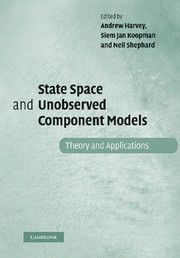Book contents
- Frontmatter
- Contents
- Preface
- Acknowledgements
- Part I State space models
- Part II Testing
- Part III Bayesian inference and bootstrap
- Part IV Applications
- 10 Measuring and forecasting financial variability using realised variance
- 11 Practical filtering for stochastic volatility models
- 12 On RegComponent time series models and their applications
- 13 State space modelling in macroeconomics and finance using SsfPackin S+Finmetrics
- 14 Finding genes in the human genome with hidden Markov models
- References
- Author index
- Subject index
12 - On RegComponent time series models and their applications
Published online by Cambridge University Press: 06 January 2010
- Frontmatter
- Contents
- Preface
- Acknowledgements
- Part I State space models
- Part II Testing
- Part III Bayesian inference and bootstrap
- Part IV Applications
- 10 Measuring and forecasting financial variability using realised variance
- 11 Practical filtering for stochastic volatility models
- 12 On RegComponent time series models and their applications
- 13 State space modelling in macroeconomics and finance using SsfPackin S+Finmetrics
- 14 Finding genes in the human genome with hidden Markov models
- References
- Author index
- Subject index
Summary
Abstract
We use the term ‘RegComponent’ model to refer to a regression model whose errors follow an ARIMA component time series model. This is a generalisation of ‘RegARIMA’ models for which the error term follows a standard ARIMA model. Specific forms of RegComponent models (e.g., ‘structural models’) have been used for some time in connection with modelling seasonal time series and for model-based seasonal adjustment, but this paper takes a broader view of RegComponent models. We discuss a general form for RegComponent models along with some theoretical considerations in their treatment regarding likelihood evaluation, likelihood maximisation, forecasting and signal extraction. We also illustrate the use of RegComponent models on some less familiar applications. These include: (i) modelling and seasonal adjustment of time series observed with sampling error; (ii) use of regression models with stochastically time-varying regression parameters and error terms that follow ARIMA or ARIMA component models; and (iii) using components present only occasionally to allow for seasonal or other types of heteroskedasticity. The examples presented illustrate both some of the general model capabilities and some of the capabilities of the US Census Bureau's REGCMPNT computer program, which handles general RegComponent models.
Introduction
This paper explores the use of RegComponent time series models. We use the term ‘RegComponent’ model to refer to a time series model with a regression mean function and an error term that follows an ARIMA component time series model. This is a generalisation of ‘RegARIMA’ models for which the error term follows a standard ARIMA (autoregressive-integrated-moving average) time series model (Box and Jenkins 1976). This paper provides an overview of RegComponent models and illustrates their use with three examples.
- Type
- Chapter
- Information
- State Space and Unobserved Component ModelsTheory and Applications, pp. 248 - 283Publisher: Cambridge University PressPrint publication year: 2004
- 16
- Cited by



